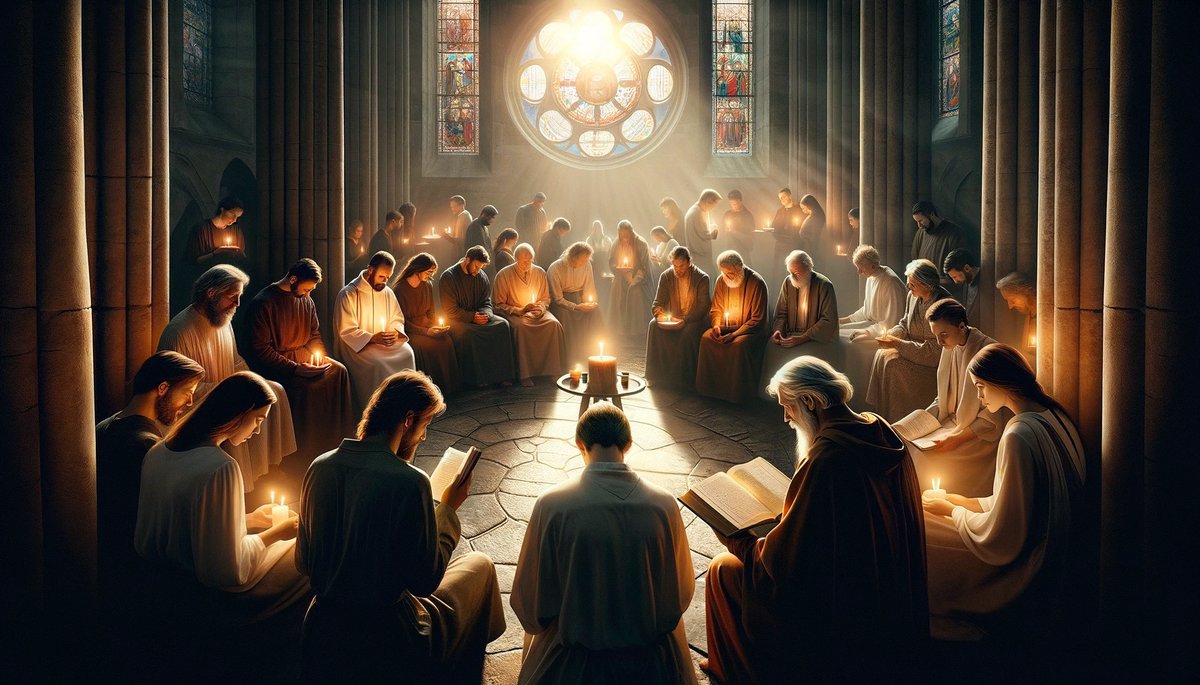Home>Special Themes>What Are We Waiting For In Advent?


Special Themes
What Are We Waiting For In Advent?
Published: February 14, 2024
Ericka Andersen, an editor at Christian.net, expertly merges digital strategy with content creation, focusing on faith and societal issues. Her communication skills enhance the platform's engaging narratives, fostering meaningful dialogue on belief's impact on society.
Discover the significance of Advent and the special themes we anticipate during this sacred season. Explore what we are waiting for and the spiritual significance it holds.
(Many of the links in this article redirect to a specific reviewed product. Your purchase of these products through affiliate links helps to generate commission for Christian.net, at no extra cost. Learn more)
Table of Contents
Introduction
Advent is a time of anticipation, a period of joyful expectation, and a season of preparation. It marks the beginning of the liturgical year in many Christian traditions and is a time of spiritual reflection and contemplation. As we enter into this sacred season, we are reminded of the profound significance of waiting and the deep sense of hope that accompanies it.
The word "Advent" is derived from the Latin word "adventus," which means "coming" or "arrival." It encapsulates the sense of expectancy and longing for the arrival of something momentous and transformative. In the context of the Christian faith, Advent heralds the anticipation of the birth of Jesus Christ, the Messiah, and also serves as a reminder of the promise of his second coming.
During Advent, we are called to embrace a spirit of hopeful waiting, to prepare our hearts and minds for the celebration of Christ's birth, and to reflect on the profound implications of his coming into the world. It is a time to pause, to ponder, and to rekindle the sense of wonder and awe at the miracle of the Incarnation.
As we embark on this journey through Advent, we are invited to immerse ourselves in the rich tapestry of traditions and rituals that have been woven into this sacred season. From the lighting of the Advent wreath to the singing of hymns and carols that echo the longing of generations past, each element of this season serves as a poignant reminder of the enduring significance of Christ's coming.
In the midst of the hustle and bustle of the holiday season, Advent beckons us to carve out moments of stillness and reflection, to cultivate a sense of eager anticipation, and to open our hearts to the transformative power of hope. It is a time to rekindle the flame of faith, to renew our commitment to love and justice, and to embrace the promise of redemption that Christ's coming embodies.
As we journey through the weeks of Advent, let us embrace the invitation to wait with purpose and intention, to prepare with joy and anticipation, and to cultivate a spirit of hope that transcends the challenges and uncertainties of our time. This season beckons us to embrace the profound mystery of waiting and to awaken to the transformative power of hope.
Read more: What Do We Celebrate On Advent
The Meaning of Advent
Advent, the beginning of the liturgical year in many Christian traditions, holds profound significance as a time of spiritual reflection and anticipation. The word "Advent" originates from the Latin term "adventus," meaning "coming" or "arrival." This encapsulates the essence of the season, signifying the expectancy and longing for the arrival of something momentous and transformative.
At its core, Advent symbolizes the dual nature of waiting. It serves as a poignant reminder of the anticipation of the birth of Jesus Christ, the Messiah, while also underscoring the promise of his second coming. This period of waiting is not passive but rather an active and purposeful engagement with the profound implications of Christ's arrival.
The four weeks of Advent are marked by the lighting of the Advent wreath, a symbolic gesture that represents the increasing light and hope as Christmas draws near. Each candle lit on the wreath signifies different aspects of the spiritual preparation leading up to the birth of Christ. The rituals and traditions associated with Advent, such as the singing of hymns and carols, the observance of the Jesse Tree, and the practice of daily devotions, all contribute to the rich tapestry of this sacred season.
Advent also serves as a time of introspection, inviting individuals to prepare their hearts and minds for the celebration of Christ's birth. It is an opportunity to reflect on the significance of the Incarnation and to rekindle a sense of wonder and awe at the miracle of God becoming human. The season calls for a deliberate pause amid the busyness of life, allowing for moments of stillness and contemplation.
Furthermore, Advent is a season of hope, reminding believers of the promise of redemption that Christ's coming embodies. It encourages a rekindling of faith, a renewal of commitment to love and justice, and an embrace of the transformative power of hope. This period of waiting is not merely a countdown to Christmas but a profound journey of spiritual renewal and anticipation.
In essence, the meaning of Advent extends beyond the anticipation of a historical event. It encompasses the timeless longing for the fulfillment of God's promises, the hope for a world renewed and restored, and the joyous expectation of the coming of Emmanuel, "God with us." It is a season that beckons believers to embrace the mystery of waiting and to awaken to the transformative power of hope, ultimately preparing hearts to receive the gift of Christ's presence in a world yearning for light and redemption.
The Expectation of Christ's Coming
The expectation of Christ's coming during the season of Advent is imbued with profound significance and rich theological depth. It encompasses the anticipation of the birth of Jesus Christ, the Messiah, and the contemplation of his promised second coming. This dual focus on the past and future advents of Christ creates a sense of eager expectation and hopeful longing among believers.
The historical context of Christ's birth in Bethlehem serves as a focal point for reflection during Advent. The prophecies foretelling the coming of a savior, the angelic announcements to Mary and Joseph, and the humble nativity scene all contribute to the anticipation of the incarnation of God in human form. The birth of Jesus represents the fulfillment of ancient promises and the dawning of a new era of salvation and redemption for humanity.
Simultaneously, Advent directs attention to the eschatological hope of Christ's second coming. The scriptures abound with references to the triumphant return of Christ, signaling the consummation of God's redemptive plan for the world. This future advent is envisioned as a time of restoration, renewal, and the establishment of God's eternal kingdom. The anticipation of Christ's return inspires believers to live with a sense of readiness, vigilance, and spiritual preparedness.
The expectation of Christ's coming during Advent is not merely a commemoration of past events or a speculative gaze into the future. It is a call to embrace the present reality of Christ's abiding presence in the midst of human history. The season invites believers to recognize the ways in which Christ continues to come into their lives, offering hope, healing, and transformation. It prompts a reorientation of hearts and minds toward the enduring promise of Emmanuel, "God with us," in the midst of life's joys and struggles.
In essence, the expectation of Christ's coming during Advent encompasses a multi-layered awareness of the past, present, and future dimensions of Christ's presence. It fosters a spirit of hopeful anticipation, a deep longing for the fulfillment of God's promises, and a steadfast faith in the redemptive work of Christ. This profound sense of expectation infuses the season with a palpable sense of awe and wonder, inviting believers to prepare their hearts to receive the gift of Christ's presence in ever-deepening ways.
The expectation of Christ's coming during Advent serves as a poignant reminder of the enduring significance of Christ's birth and the abiding hope of his promised return. It calls believers to embrace the mystery of waiting with eager anticipation, to prepare their hearts to receive the transformative power of Christ's presence, and to cultivate a spirit of hope that transcends the challenges and uncertainties of the present age.
The Preparation for Christ's Arrival
The season of Advent heralds a profound call to prepare for the arrival of Christ, both in commemoration of his historical birth and in anticipation of his promised return. This period of spiritual preparation encompasses a multifaceted journey of introspection, repentance, and joyful expectation.
At its core, the preparation for Christ's arrival invites believers to engage in a deliberate process of self-examination and spiritual readiness. It calls for a turning inward, a reflective posture that allows individuals to assess the state of their hearts and the alignment of their lives with the teachings of Christ. This introspective journey often involves practices such as prayer, meditation, and the examination of conscience, creating space for personal and communal renewal.
Furthermore, the preparation for Christ's arrival entails a call to repentance and reconciliation. It prompts believers to confront areas of brokenness, sin, and estrangement, both in their relationship with God and with others. This season offers an opportunity for confession, forgiveness, and the restoration of relationships, fostering a spirit of humility and openness to the transformative grace of God.
In addition, the preparation for Christ's arrival involves acts of compassionate service and justice-seeking. It inspires believers to embody the love and compassion exemplified by Christ, reaching out to those in need, advocating for the marginalized, and working towards the establishment of God's kingdom of justice and peace. This outward expression of faith reflects the transformative impact of Christ's presence in the world and serves as a tangible demonstration of the values inherent in his teachings.
Moreover, the preparation for Christ's arrival encompasses the cultivation of joyful expectation and hopeful anticipation. It involves the active engagement with traditions and rituals that mark the Advent season, such as the lighting of the Advent wreath, the singing of hymns and carols, and the observance of spiritual disciplines. These practices serve to heighten the sense of longing and readiness for the celebration of Christ's birth, infusing the season with a spirit of joy and anticipation.
Ultimately, the preparation for Christ's arrival is a holistic and transformative journey that encompasses the spiritual, relational, and communal dimensions of faith. It calls believers to prepare their hearts, minds, and lives to receive the gift of Christ's presence with renewed fervor and openness. This season of preparation serves as a poignant reminder of the enduring significance of Christ's arrival and invites believers to embrace the transformative power of hope and renewal as they await the celebration of the Incarnation.
This period of spiritual preparation is not merely a ritualistic observance but a profound invitation to enter into a deeper relationship with Christ, to embody his teachings in the world, and to cultivate a spirit of joyful expectation that transcends the temporal and points towards the eternal. As believers engage in the preparation for Christ's arrival, they are beckoned to embrace the mystery of waiting with purpose and intention, to prepare with joy and anticipation, and to awaken to the transformative power of hope that Christ's coming embodies.
The Hope for Redemption
The season of Advent encapsulates a profound sense of hope for redemption, echoing the timeless longing for the fulfillment of God's promises and the restoration of a broken world. At its core, the hope for redemption is intricately woven into the fabric of the Advent season, serving as a beacon of light amidst the darkness and a source of enduring comfort in the midst of uncertainty.
The hope for redemption emanates from the foundational belief in the transformative power of Christ's coming. It represents the deep-seated conviction that through the Incarnation, God has entered into human history to bring about healing, renewal, and reconciliation. This hope is rooted in the assurance that the birth of Jesus heralds the dawning of a new era of salvation, offering the promise of forgiveness, restoration, and the renewal of all creation.
Furthermore, the hope for redemption extends beyond the commemoration of Christ's historical birth to encompass the anticipation of his promised return. This eschatological hope infuses the season with a profound sense of longing for the ultimate fulfillment of God's redemptive plan. It inspires believers to look towards the future with eager anticipation, embracing the vision of a world renewed and restored in the light of Christ's triumphant return.
The hope for redemption also resonates deeply with the human experience, speaking to the universal yearning for healing and wholeness. In the midst of personal struggles, societal challenges, and global crises, this hope serves as a steadfast anchor, offering solace and strength in the face of adversity. It kindles a sense of resilience, inspiring individuals to persevere with courage and faith, knowing that the promise of redemption transcends the limitations of the present moment.
Moreover, the hope for redemption fosters a spirit of solidarity and compassion, prompting believers to actively engage in the work of justice, mercy, and reconciliation. It calls for a commitment to address systemic injustices, to advocate for the marginalized, and to work towards the establishment of God's kingdom of love and equity. This hope empowers individuals to become agents of positive change, embodying the transformative values inherent in Christ's teachings.
In essence, the hope for redemption is a foundational theme of the Advent season, resonating with the timeless longing for the fulfillment of God's promises and the restoration of a broken world. It serves as a powerful reminder of the enduring significance of Christ's coming and invites believers to embrace the transformative power of hope as they await the celebration of the Incarnation. This hope transcends the temporal and points towards the eternal, offering a profound sense of assurance and comfort in the midst of life's complexities and challenges.
Read more: Why Do We Celebrate Advent?
Conclusion
As we journey through the sacred season of Advent, we are reminded of the profound significance of waiting, the deep sense of hope that accompanies it, and the transformative power of Christ's coming. Advent beckons us to embrace a spirit of hopeful waiting, to prepare our hearts and minds for the celebration of Christ's birth, and to reflect on the profound implications of his coming into the world. It is a time to pause, to ponder, and to rekindle the sense of wonder and awe at the miracle of the Incarnation.
The multifaceted layers of Advent – the anticipation of Christ's coming, the preparation for his arrival, and the hope for redemption – converge to create a rich tapestry of spiritual significance. This season calls for a deliberate pause amid the busyness of life, allowing for moments of stillness and contemplation. It invites believers to recognize the ways in which Christ continues to come into their lives, offering hope, healing, and transformation.
The expectation of Christ's coming during Advent encompasses a multi-layered awareness of the past, present, and future dimensions of Christ's presence. It fosters a spirit of hopeful anticipation, a deep longing for the fulfillment of God's promises, and a steadfast faith in the redemptive work of Christ. This profound sense of expectation infuses the season with a palpable sense of awe and wonder, inviting believers to prepare their hearts to receive the gift of Christ's presence in ever-deepening ways.
The preparation for Christ's arrival is a holistic and transformative journey that encompasses the spiritual, relational, and communal dimensions of faith. It calls believers to prepare their hearts, minds, and lives to receive the gift of Christ's presence with renewed fervor and openness. This season of preparation serves as a poignant reminder of the enduring significance of Christ's arrival and invites believers to embrace the transformative power of hope and renewal as they await the celebration of the Incarnation.
The hope for redemption, resonating with the timeless longing for the fulfillment of God's promises and the restoration of a broken world, serves as a steadfast anchor, offering solace and strength in the face of adversity. It kindles a sense of resilience, inspiring individuals to persevere with courage and faith, knowing that the promise of redemption transcends the limitations of the present moment.
As we conclude this reflection on the profound themes of Advent, let us carry forward the spirit of hopeful waiting, joyful preparation, and steadfast hope into our lives. May the transformative power of Christ's coming continue to inspire and sustain us, infusing our hearts with the enduring light of hope and the promise of redemption.














